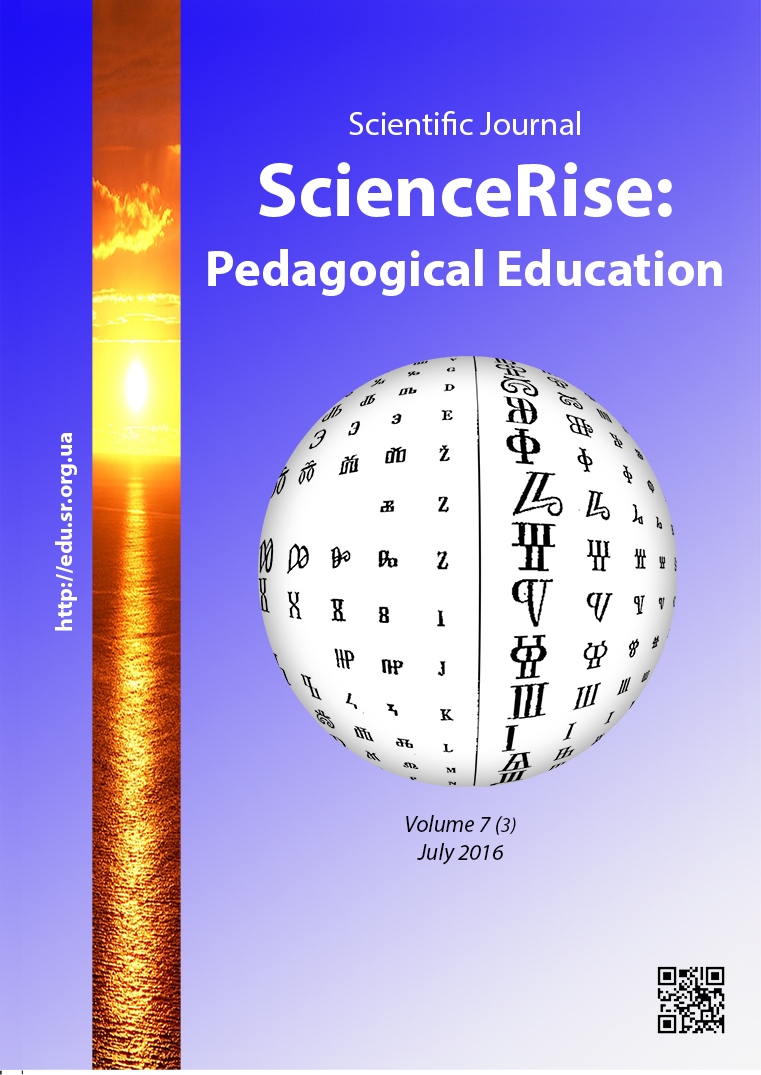The problem of personal development in the conditions of renewal of informational culture of society
DOI:
https://doi.org/10.15587/2519-4984.2016.74553Keywords:
person, information, culture, need, informational culture, informational need, informational societyAbstract
The problem of personal formation in the modern conditions of growth of the role of informational-communicational technologies becomes the one of topical problems in the field of pedagogical studies. The volume of information, informational resources and correspondent technologies significantly influence both the different sides of social life and the processes of human personal formation in particular.
This article is devoted to the analysis of approaches, ideas, concerning the study of the features of personal formation in informational society. The research demonstrated that scientists connect the solution of this problem with formation of the human informational culture. In the work was presented the process of perception of the essence of this category and also outlined the series of notions, which essence allows specify the content of notion “informational culture”. These categories are: information, culture, informational needs.
The special attention in the article was paid to the development of informational needs in educational institutions. In particular there were denoted the directions and means for solving this problem
References
- Abdeev, R. F. (1994). Filosofija informacionnoj civilizacii. Moscow: Vlados, 336.
- Vorob'ev, G. G. (1988). Tvoja informacionnaja kul'tura. Moscow: Molodaja gvardija, 303.
- Demidenko, Je. S. (1994). Velikij social'no-kul'turnyj perehod chelovechestva. Istoricheskaja postup' kul'tury: zemledel'cheskaja, urbanisticheskaja, noosfernaja. Brjansk, 3–20.
- Moiseev, N. N. (1990). Chelovek i noosfera. Moscow: Molodaja gvardija, 351.
- Beh, I. D. (2003). Vyhovannja osobystosti. Kn. 1. Osobystisnoorijentovanyj pidhid: teoretyko-tehnologichni zasady. Kyiv: Lybid', 280.
- Boryshevs'kyj, M. Y. (2012). Osobystist' u vymirah samosvidomosti. Sumy: Vydavnychyj budynok «Ellada», 608.
- Bueva, L. P. (1988). Social'naja sreda i soznanie lichnosti. Moscow: MGU, 180.
- Kuz'mina, N. V. (1990). Professionalizm lichnosti prepodavatelja i mastera proizvodstvennogo obuchenija. Moscow: Vysshaja shkola, 119.
- Babanskij, Ju. K. (1989). Izbrannye pedagogicheskie Trudy. Moscow: Pedagogika, 560.
- Karakovskij, V. A. (1993). Stat' chelovekom: obshhechelovecheskie cennosti – osnova celostnogo uchebno-vospitatel'nogo processa. Moscow: Tvorcheskaja pedagogika, 80.
- Ruvinskij, L. I. (1981). Nravstvennoe vospitanie lichnosti. Moscwo: Izd-vo MGU, 184.
- Abul'hanova-Slavskaja, K. A. (1991). Strategija zhizni. Moscow: Mysl', 299.
- Slastenin, V. A., Kashirin, V. P. (2009). Psihologija i pedagogika. Moscow: Izdatel'skij centr«Akademija», 543.
- Ursul, A. D. (1994). Model' ustojchivogo razvitija civilizacii: informacionnye aspekty. NTI. Serija 2, 12, 6.
- Gerkulov, A. L. (Ed.) (1989). Filosofskij jenciklopedicheskij slovar'. Moscow: Sov. Jenciklopedija, 814.
- Gromov, G. R. (1988). Gumanitarnye osnovy informacionnoj tehnologii. Moscow: INION, 35.
- Ershov, A. P. (1982). Informacija: ot komp'juternoj gramotnosti uchashhihsja k informacionnoj kul'ture. Kommunist, 2, 82–92.
- Kanygin, Ju. M. (1991). Informatizacija upravlenija: social'nye aspekty. Kyiv: Naukova dumka, 155.
- Kolin, K. K. (2006). Informacionnaja kul'tura v informacionnom obshhestve. Otkrytoe obrazovanie, 6, 50–57.
- Rakitov, A. I. (1991). Filosofija komp'juternoj revoljucii. Moscow: Politizdat, 286.
- Polonskij, V. M. (1995). Nauchno-pedagogicheskaja informacija. Moscow: Novaja shkola, 256.
- Kukin, V. I. Informatika: organizacija i upravlenie. Moscow: Jekonomika, 175.
- Alekseev, A. A. (1990). Informatizacija regionov Rossii. Novosibirsk: Nauka, 382.
- Shtompel, O. M. (Ed.) (1996). Chelovek i obshhestvo: Kul'turologija: Slovar' – spravochnik. Rostov-na-Donu: Feniks, 544.
- Gendina, N. I. (1997). nformacionnaja kul'tura i informacionnoe obrazovanie. Informacionnoe obshhestvo: kul'turologicheskie aspekty i problemy. Krasnodar, 102–104.
- Suhanov, A. P.; Sitanova, A. L. (Ed.) (1988). Informacija i progress. Novosibirsk: Nauka, 192.
- Kastel's, M. (2000). Informacionnaja jepoha: jekonomika, obshhestvo i kul'tura. Moscow: Teis, 607.
- Migolat'ev, A. A. (2002). Filosofija kul'tury. Social'no-gumanitarnye znanija, 5, 86–100.
- Levit, S. Ja. (Ed.) (1998). Kul'turologija. XX vek: Jenciklopedija. Vol. 1. Sankt-Peterburg: Universitetskaja kniga; OOO "Aletejja", 269–270.
- Kogan, V. Z. (1981). Chelovek v potoke informacii. Novosibirsk: Nauka, 177.
- Bonic, M. (1987). Nauchnoe issledovanie i nauchnaja informacija. Moscow: Nauka, 156.
- Markova, N. D. (2003). Sociokul'turnye osnovanija processa formirovanija lichnostnoj struktury cheloveka v uslovijah stanovlenija informacionnogo obshhestva. Kemerovo, 199.
- Matros, D. Sh., Polev, D. M., Mel'nikova, N. N. (1999). Upravlenie kachestvom obrazovanija na osnove novyh informacionnyh tehnologij i obrazovatel'nogo monitoring. Moscow: Pedagogicheskoe obshhestvo Rossii, 173.
- Shrejder, Ju. A. (1991). Informacija i kul'tura. NTI. Ser. 2, 8, 1–9.
Downloads
Published
How to Cite
Issue
Section
License
Copyright (c) 2016 Ярослав Володимирович Галета

This work is licensed under a Creative Commons Attribution 4.0 International License.
Our journal abides by the Creative Commons CC BY copyright rights and permissions for open access journals.
Authors, who are published in this journal, agree to the following conditions:
1. The authors reserve the right to authorship of the work and pass the first publication right of this work to the journal under the terms of a Creative Commons CC BY, which allows others to freely distribute the published research with the obligatory reference to the authors of the original work and the first publication of the work in this journal.
2. The authors have the right to conclude separate supplement agreements that relate to non-exclusive work distribution in the form in which it has been published by the journal (for example, to upload the work to the online storage of the journal or publish it as part of a monograph), provided that the reference to the first publication of the work in this journal is included.







